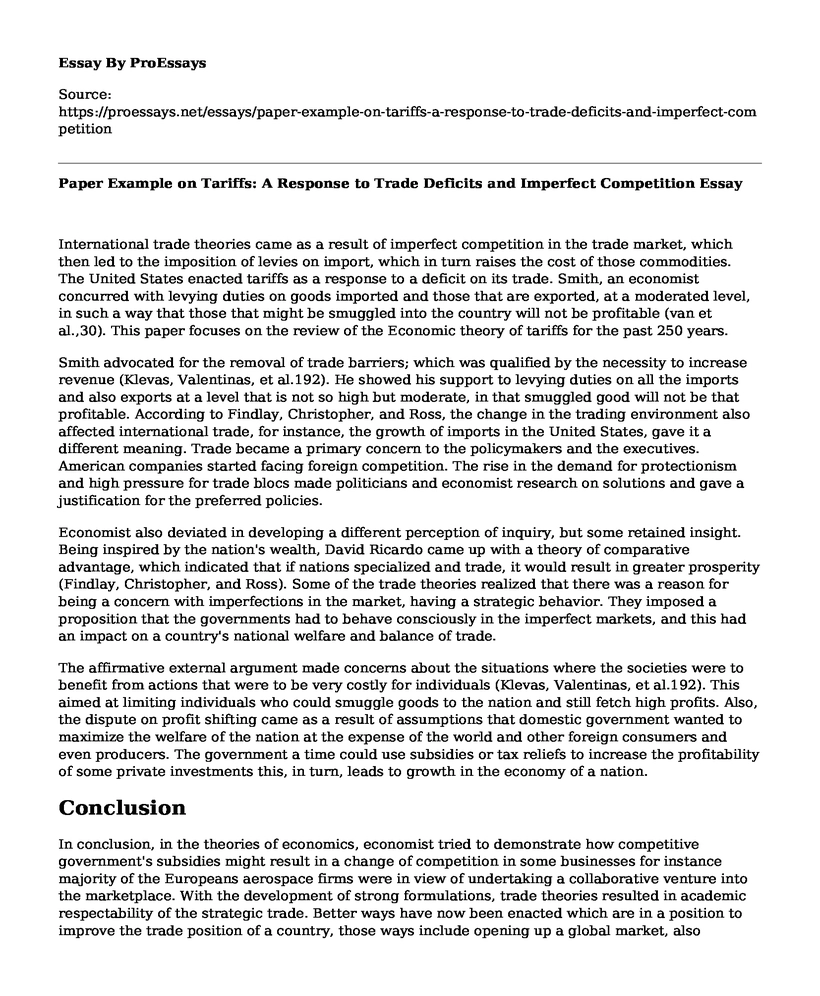International trade theories came as a result of imperfect competition in the trade market, which then led to the imposition of levies on import, which in turn raises the cost of those commodities. The United States enacted tariffs as a response to a deficit on its trade. Smith, an economist concurred with levying duties on goods imported and those that are exported, at a moderated level, in such a way that those that might be smuggled into the country will not be profitable (van et al.,30). This paper focuses on the review of the Economic theory of tariffs for the past 250 years.
Smith advocated for the removal of trade barriers; which was qualified by the necessity to increase revenue (Klevas, Valentinas, et al.192). He showed his support to levying duties on all the imports and also exports at a level that is not so high but moderate, in that smuggled good will not be that profitable. According to Findlay, Christopher, and Ross, the change in the trading environment also affected international trade, for instance, the growth of imports in the United States, gave it a different meaning. Trade became a primary concern to the policymakers and the executives. American companies started facing foreign competition. The rise in the demand for protectionism and high pressure for trade blocs made politicians and economist research on solutions and gave a justification for the preferred policies.
Economist also deviated in developing a different perception of inquiry, but some retained insight. Being inspired by the nation's wealth, David Ricardo came up with a theory of comparative advantage, which indicated that if nations specialized and trade, it would result in greater prosperity (Findlay, Christopher, and Ross). Some of the trade theories realized that there was a reason for being a concern with imperfections in the market, having a strategic behavior. They imposed a proposition that the governments had to behave consciously in the imperfect markets, and this had an impact on a country's national welfare and balance of trade.
The affirmative external argument made concerns about the situations where the societies were to benefit from actions that were to be very costly for individuals (Klevas, Valentinas, et al.192). This aimed at limiting individuals who could smuggle goods to the nation and still fetch high profits. Also, the dispute on profit shifting came as a result of assumptions that domestic government wanted to maximize the welfare of the nation at the expense of the world and other foreign consumers and even producers. The government a time could use subsidies or tax reliefs to increase the profitability of some private investments this, in turn, leads to growth in the economy of a nation.
Conclusion
In conclusion, in the theories of economics, economist tried to demonstrate how competitive government's subsidies might result in a change of competition in some businesses for instance majority of the Europeans aerospace firms were in view of undertaking a collaborative venture into the marketplace. With the development of strong formulations, trade theories resulted in academic respectability of the strategic trade. Better ways have now been enacted which are in a position to improve the trade position of a country, those ways include opening up a global market, also exporting more, rather than fewer imports. Countries can open up markets so that nations can sell more of their products, this; will intern bring more prosperity.
Works cited
Findlay, Christopher, and Ross Garnaut. The political economy of manufacturing protection: Experiences of ASEAN and Australia. Routledge, 2017.
Klevas, Valentinas, et al. "Microeconomic analysis for the formation of renewable energy support policy: The case of wind power sector in lithuania." Inzinerine ekonomika (2018): 188-196.
van Tongeren, Frank, et al. "Back to the Future: A 25-year Retrospective on GTAP and the Shaping of a New Agenda." Journal of Global Economic Analysis 2.2 (2017): 1-42.
Cite this page
Paper Example on Tariffs: A Response to Trade Deficits and Imperfect Competition. (2023, Feb 12). Retrieved from https://proessays.net/essays/paper-example-on-tariffs-a-response-to-trade-deficits-and-imperfect-competition
If you are the original author of this essay and no longer wish to have it published on the ProEssays website, please click below to request its removal:
- Return on Investment for Implementation of a Crew Resource Management Program
- Public Health Campaign - Research Paper
- Essay on Shanghai Baby: Gender, Market and Consumer Culture in Chinese Cities
- Essay on Pizza Hut Reaps Benefits From Technology: Innovative Sales Processes
- Essay on Energy Consumption and Economic Growth in Brazil: A Decade of Increase
- New Balance: Understanding Consumer Decision-Making Process - Essay Sample
- Essay Example on Coca-Cola Advertisement







